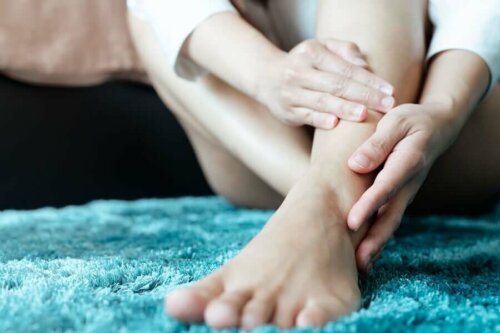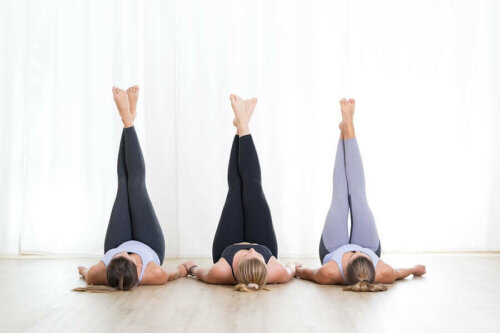Learn to Relieve Pain and Heaviness in Your Legs


Written and verified by the pedagogue in physical education and nutritionist Elisa Morales Lupayante
Heaviness in your legs and pain are discomforts that don’t discriminate between sexes or ages. That’s why anyone can suffer from this discomfort. Additionally, it can be caused by different factors such as long workdays, water retention, poor circulation, sedentary lifestyle, high environmental temperatures.
Depending on the cause, relief treatment will differ. However, it’s clear that a healthy lifestyle has a positive influence. Let’s look at more below to understand this.
Causes of heaviness in your legs

- Pregnancy
- Sedentary lifestyle
- Heart failure
- Water retention
- Premenstrual Syndrome
- Thyroid problems
- Excess sodium in your diet
- Liver or kidney failure
- Certain medications, such as antihypertensive drugs, antidepressants, and contraceptive pills
Heat makes this problem worse because it has a vasodilator effect that causes your blood to leave your veins and build up underneath tissues. This causes inflammation, especially in your ankles. Therefore, it’s very common that heaviness in your legs occurs more frequently during the hot weather and in warm climate regions.
Recommendations to relieve leg pain
To relieve heaviness and pain in your legs, several lifestyle changes must be made. The most important are the following.
- Maintain a healthy and balanced diet. Make sure you eat foods that are high in fiber and increase your consumption of fruits and vegetables. Especially eat more of the ones that have diuretic properties.
- Avoid eating excessive amounts of salt and replace it with other herbs and spices. It should be noted that some should be used with caution, such as cinnamon and ginger, as they are contraindicated in some cases.
- Drink lots of liquids to promote the elimination of toxins
- Avoid drinking industrial beverages, including juices and flavored waters
- Cut saturated fats, sausages, white sugar, and products with refined flour out of your diet
- Exercise and maintain good control of your body mass index (BMI). Remember that being overweight makes blood circulation more difficult and worsens your overall malaise.
- Aerobic activity is highly recommended. For example, walking, running, biking, and even dancing will help you alleviate short and long-term problems.
- Don’t be on your feet without rest for too long. Stay active and don’t let the day go by without at least 30 minutes of physical activity.
- You can use elastic stockings because they keep your calf muscles contained nicely
- Stop wearing underwear that’s too tight and garments that don’t let your skin breathe. Underwear that’s too tight makes it difficult for venous blood to circulate to your legs and heart.
Learn how to do This Exercise Routine that’ll Quickly Help Tone Your Legs
Massages for tired legs

It’s said that massages don’t just contribute to relaxation and the release of accumulated tensions. They also stimulate circulation and relieve the discomfort of tired legs. To perform them on your own at home, it is recommended to use a cream with a relaxing aroma, such as lavender, or a little essential oil diluted in water.
Massages done with any of these essential oils will alleviate much more than without them. It’s a good idea to do these massages at night before going to bed. This will help you sleep better.
Teas that promote circulation
If the heaviness in your legs is due to poor circulation, try drinking some natural teas. Not just because they help keep your body well hydrated, but also because they’ll help avoid consuming beverages that don’t contribute anything good to your body.
Some options to choose from are natural juices and herbal teas, such as butcher’s broom, horsetail, and ginkgo Biloba.
Practical recommendations

- Watch your blood pressure
- Put your legs in the air for at least 15 minutes per day to promote good circulation
- Avoid being in the same position for a long period of time without resting, especially if you’re wearing uncomfortable shoes
- Submerge your legs in cold water for a little bit to stimulate your circulation
Summary
There are several healthy habits that can help relieve the sensation of pain and heaviness in your legs. Exercises added to massages, and some natural supplements can alleviate these symptoms and improve circulation in this area.
However, if the problem becomes persistent, it’s essential to consult a physician, as sometimes the ailment occurs as a result of more serious health conditions. If so, you must follow their medical treatment.
All cited sources were thoroughly reviewed by our team to ensure their quality, reliability, currency, and validity. The bibliography of this article was considered reliable and of academic or scientific accuracy.
- Mayo Clinic Staff. (2016, March 4). Leg pain
mayoclinic.org/symptoms/leg-pain/basics/definition/sym-20050784 - Rajasekaran, S., & Finnoff, J. T. (2016). Exertional Leg Pain. Physical Medicine and Rehabilitation Clinics of North America. https://doi.org/10.1016/j.pmr.2015.08.012
- Gazillo, L. M., & Middlemas, D. A. (2001). Therapeutic massage techniques. Aquatic Therapy Today. https://doi.org/10.1123/att.6.3.5
- Ude, C., Schubert-Zsilavecz, M., & Wurglics, M. (2013). Ginkgo biloba extracts: A review of the pharmacokinetics of the active ingredients. Clinical Pharmacokinetics. https://doi.org/10.1007/s40262-013-0074-5
- Sandhu, N. S., Kaur, S., & Chopra, D. (2010). Equietum arvense: Pharmacology and phytochemistry – a review. Asian Journal of Pharmaceutical and Clinical Research. https://doi.org/10.1016/j.bpj.2008.11.044
- Ruscus aculeatus (butcher’s broom). (2001). Alternative Medicine Review.
This text is provided for informational purposes only and does not replace consultation with a professional. If in doubt, consult your specialist.








